What is Search Engine Optimization?
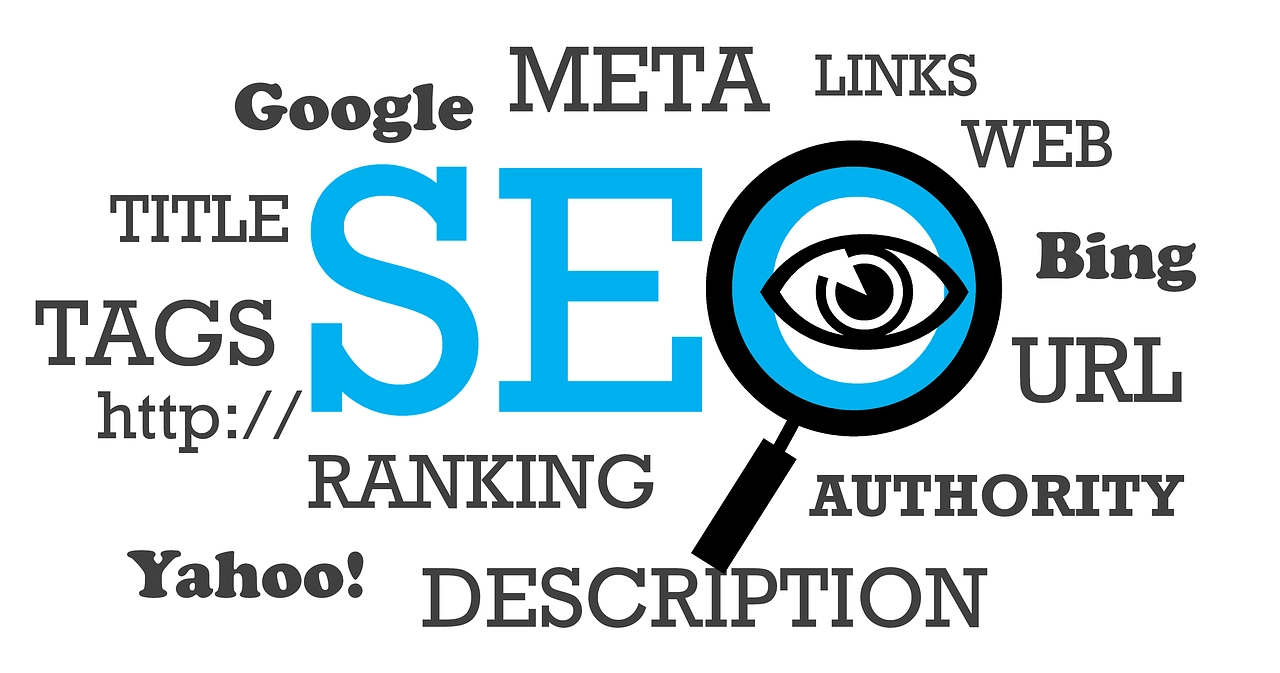
Search engine optimization (SEO) is optimizing website content, code, and other elements to improve its visibility on search engines.
It involves making sure that the website appears high in the results when someone searches for related keywords or phrases.
SEO is an important part of any digital marketing strategy as it can help boost website traffic, increase brand awareness, and generate more leads and sales.
In this article, we’ll discuss what SEO is, why it is important, how SEO works as well as understand the ranking factors and Dos and Don’ts of SEO.
Table of Contents
What is SEO?
Search Engine Optimization (SEO) is the practice of optimizing web content to increase a website’s visibility on search engine results pages (SERPs).
SEO helps websites increase their organic search traffic by improving ranking for targeted keywords and phrases.
SEO is divided into a few parts, the main 2 are:
1. On-page SEO
2. Off-page SEO
On-page SEO
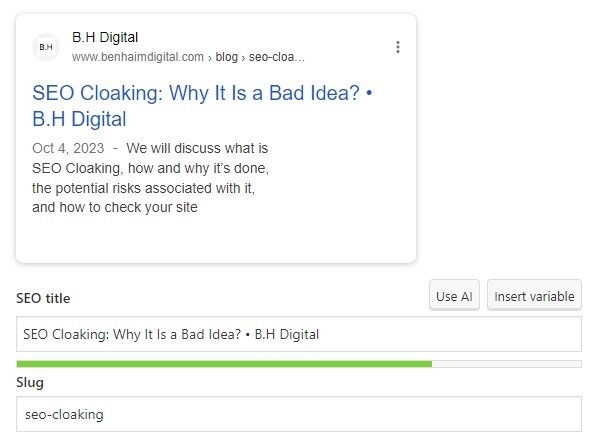
On-page SEO is the measures taken to optimize individual web pages to rank higher and earn more relevant traffic in search engines.
This includes fixing SEO technical issues, improving titles, meta descriptions, content quality, URL optimization, alt tags, structured data implementation, etc.
Off-page SEO
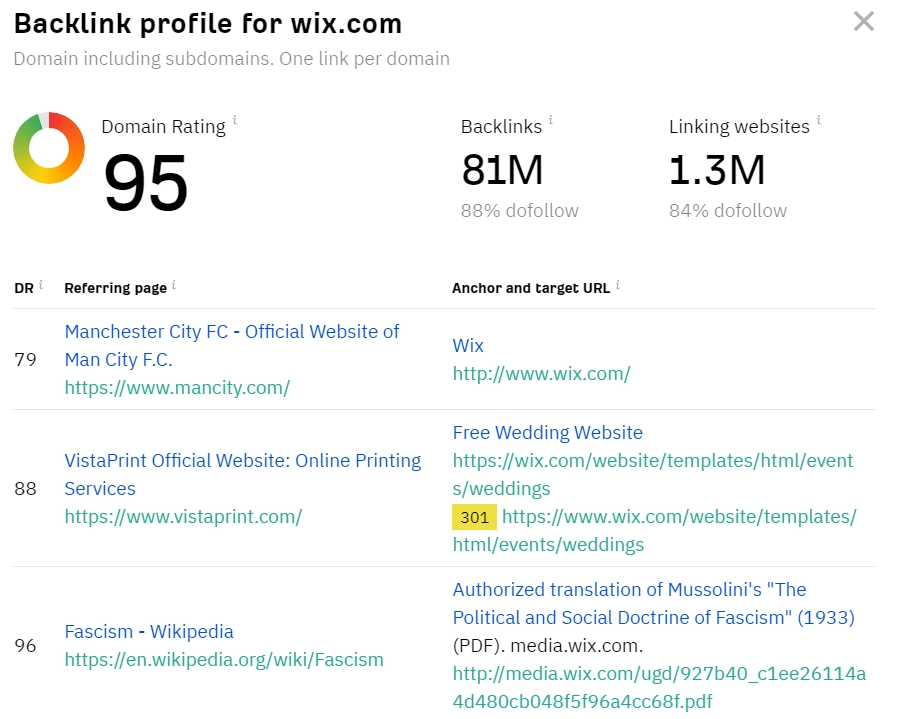
Off-page SEO refers to the activities done outside of your website that can improve your rankings and mostly refers to link building, digital PR, brand awareness, and other similar activities.
Why is SEO important?
SEO allows websites to increase their visibility in search engine results pages, which can help generate more traffic and leads.
SEO is considered a cost-effective marketing strategy as it targets users who are actively searching for products or services related to your business, making it more likely that they will convert into customers.
Moreover, SEO’s conversion rate is generally higher compared to other marketing strategies, like PPC, making it a valuable tool for businesses.
In addition, in most cases, SEO is by far the leading traffic source for websites, making it an essential part of any digital marketing strategy.
Also, SEO can help build trust and credibility with customers as it is more likely that people will trust a website that appears high in search engine results.
In today’s digital age, where the majority of people use search engines to find information and make purchase decisions, having a strong online presence through SEO is crucial for businesses to remain competitive.
How Does SEO Work?
SEO works by optimizing website content and making it more relevant to search engine algorithms.
SEO involves code editing like HTML tags, structured data implementation, titles, meta tags, headings, images, and links of a webpage to make them more relevant to the targeted keywords and phrases.
It also involves optimizing other aspects of the website such as its structure and loading speed to make it easier for search engine crawlers to index the website.
Holistic SEO also takes into account user experience and factors like mobile-friendliness, as search engines prioritize websites that provide a positive user experience.
Want More Traffic?
How Do Search Engines Work?
Search engines use algorithms to rank websites based on their relevance to the search term.
Their algorithms are constantly changing, so it’s important to keep up with the latest changes.
To find the best pages for a query, search engines use the following stages:
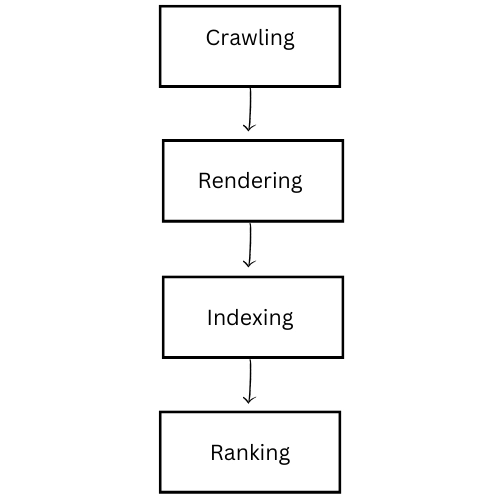
1. Crawling
Search engines use robots, also known as “crawlers” or “spiders”, to scan the web and collect information about websites. Those crawlers use links to navigate from one page to another.
2. Rendering
Once a search engine has crawled a website, it will render the webpage to analyze its content and structure.
3. Indexing
The collected data is then stored in a massive database known as the “index”. Not all pages are indexed, and the index is constantly updated as crawlers find new or updated pages.
4. Ranking
When a user enters a search query, the search engine will retrieve relevant pages from its index and rank them based on their relevance to the query.
The ranking of the website depends on over 200 factors such as relevancy, content quality, user experience, backlinks, and more.
Rank Factors in SEO
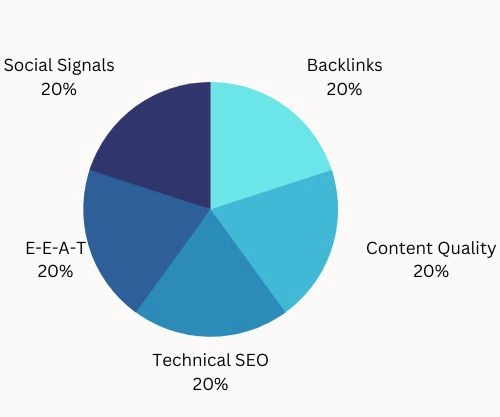
There are over 200 different factors that search engines use to rank websites, and these factors are constantly changing.
Some of the most important factors include:
Content quality
Content should be relevant and informative for the user. Search engines also favor fresh and original content.
Backlinks
Quality backlinks from other websites are important for ranking higher in search engines.
Relevance
Content should be relevant to the targeted search terms. This includes keywords, title tags, and meta descriptions.
User experience
Search engines take into consideration the usability and user experience of a website.
Factors such as site speed, mobile optimization, and user engagement play a role in ranking.
E-E-A-T
Expertise, Authoritativeness, and Trustworthiness are important factors in determining the quality and relevance of a website.
This is especially true for websites that provide health or financial information.
Social signals
Social media presence and shares can also impact a website’s ranking as it shows popularity and credibility.
Page speed
Pages should load quickly to improve user experience and rankings. Slow-loading pages can negatively impact a website’s ranking.
User experience
Search engines take into consideration the usability and user experience of a website.
Factors such as site speed, mobile optimization, and user engagement play a role in ranking.
Domain age and authority
Websites with a longer history and established authority in a certain niche may rank higher in search engines.
HTTPS encryption
Websites with secure HTTPS connections are favored by search engines as it ensures a safer and more secure browsing experience for users.
CTR

A high click-through rate (CTR) indicates that the website is useful and relevant to users.
Dos and Don’ts of SEO
Do:
- Write quality content that is relevant to the targeted keywords
- Optimize titles and meta descriptions for SEO
- Research keywords to use in content
- Build quality backlinks from other websites
- Keep website speed and user experience in mind
- Think about the users, not search engines
- Audit the website regularly
- Monitor rankings and adjust content if necessary
- Make sure it’s mobile-friendly
Don’ts:
• Use too many keywords in the content
• Use keyword stuffing in titles and meta descriptions
• Buy backlinks from low-quality websites
• Link to irrelevant websites
• Neglect the technical aspects of SEO
• Ignore user experience when optimizing content
• Use SEO cloaking methods
• Forget about the mobile version of the website
• Make content too long or too short
• Forget to track rankings and adjust content accordingly
• Ignore the importance of a good internal linking structure.
Is SEO an Important Part of Digital Marketing?
Yes, SEO is an important part of digital marketing (the most important part in my opinion):
- It can lead to higher conversion rates and sales compared to all other marketing channels
- It is cost-effective compared to other forms of digital marketing such as paid advertising.
- It’s by far
- It improves the user experience by making websites more accessible and user-friendly.
- It increases brand visibility and credibility.
- It has long-lasting effects, unlike paid advertising which stops once the budget runs out.
- It allows for targeted marketing toward specific keywords and audiences
- The only way to create digital assets that can be sold or rented leads to a potential passive income stream.
- SEO strategies can be constantly improved and adapted based on data analysis and trends.
Are SEO Tools Necessary?
While it is possible to do SEO manually, using SEO tools as well as SEO Chrome extensions, can greatly improve the efficiency and effectiveness of your efforts.
Here are some reasons why SEO tools are necessary:
Provide Valuable Insights and Data on Your Website’s Performance
Tools such as Google Analytics, SEMrush, and Ahrefs offer valuable insights and data on website performance.
They provide information on website traffic, keyword rankings, backlinks, and more.
Armed with this knowledge, you can make informed decisions about your SEO strategy, optimizing your website for success.
Automating and Time Saving
For example, schema generator tools can automate the process of creating structured data for your website which can take a lot of time and effort to do manually.
This allows you to focus on other important aspects of your digital marketing strategy.
Make It Easier to Track and Monitor Changes

Mozcast and Algoroo are valuable tools that enable the tracking and reporting of Google’s algorithm changes.
These tools make it easier to monitor and adapt your strategy in response to search engine algorithm updates.
Help With Keyword Research
Tools like Keywords Everywhere, Ahrefs Keyword Generator, and Ubersuggest can assist with keyword research, helping you find relevant and high-performing keywords to target in your content.
Content Creation

Since AI is unlikely to replace SEO shortly, taking advantage of AI tools like Jasper Rytr and ChatGPT can help generate content ideas, improve readability, and optimize content for search engines, as well as help with social media copywriting.
Competitor Analysis
Understanding what your competitors are doing and how they are ranking can give you an edge in the SEO game.
Tools like SEMrush and Ahrefs have features that allow you to analyze your competitor’s website performance, backlink profiles, and keyword rankings.
Help Identify Technical Issues

Tools like Screaming Frog, Audisto, and Deepcrawl can help identify technical issues on your website that may be affecting your SEO performance.
These tools can crawl your website and provide a comprehensive report on any errors, broken links, or other technical issues that need to be addressed.
Link Building Features
As link-building services continue to be an essential aspect of SEO, there are tools available that can help streamline and automate this process.
For example, Buzzstream and Pitchbox have features that allow you to find and reach out to potential link partners, track your outreach efforts, and manage your relationships with other websites.
Stay Up-to-Date With Trends
SEO is constantly evolving, with new trends and best practices emerging all the time.
Utilizing SEO tools can help you stay up-to-date with these changes and adapt your strategy accordingly.
Additionally, many of these tools offer resources such as webinars, blogs, and forums where you can learn from industry experts and stay informed on the latest developments in SEO.
Can I Do SEO Myself?
Yes, you can, professional SEO services are not for everyone, as businesses with a budget can start doing SEO themselves.
However, it requires a significant investment of time and effort to learn about SEO best practices, stay updated on changes, and implement them effectively.
You’ll need to familiarize yourself with the basics of SEO, like how search engines work, how to conduct keyword research, what are the best practices for link building, how to optimize your website, and more.
You should also have a good understanding of the different ranking factors and how they affect your website’s visibility in search engines.
To accomplish this, you can discover numerous tips on this blog. Additionally, explore YouTube channels, SEO books, online courses, and social media groups.
Also, consider referring to resources provided by Google and other search engines for a comprehensive understanding of its functioning.
Conclusion
SEO is an ever-changing field, but your website must stay competitive and relevant in search engine rankings.
Investing in SEO could be a life-changing decision for an online business, and while professional services may be expensive for some, there are resources available that can help you learn and implement SEO strategies on your own.
It’s important to stay updated and continuously adapt to changes in the SEO landscape. With the right knowledge and tools, you can improve your website’s visibility and attract more traffic organically.

Moshe Ben Haim
Moshe Ben Haim is an SEO expert and the founder and CEO of B.H Digital.
With over 7 years of experience in the field, Moshe has helped countless clients increase their visibility and reach potential customers online.
Before founding B.H Digital, Moshe worked as an SEO specialist at top-notch companies like Wix, 888 Holdings and Verbit.



